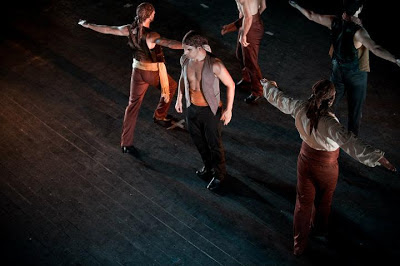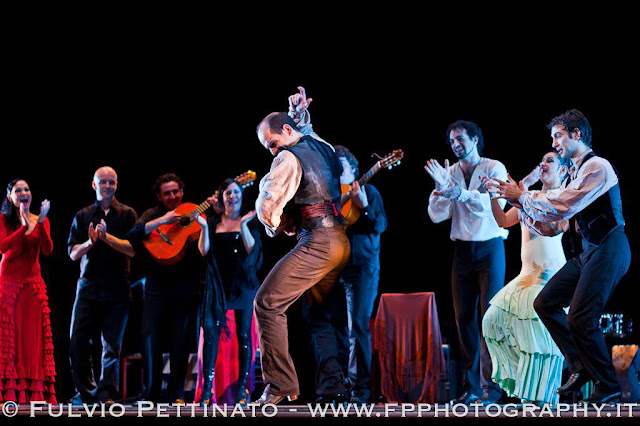Flamenco & studies in Madrid
From a young age, Giorgos had discovered his inclination to dance. Finally, this love found its complete expression in the Spanich capital. Changing country at his 18 following his dream-desire, he managed to become a professional Flamenco Dancer in Madrid.

Name: Giorgos (George) Kirkilis
Artistic Name: Jorge Atenas
Age: 25
From: Piraeus, Greece
To: Madrid, Spain
For: Flamenco & Business Administration Studies (Complutense de Madrid University)
1. Your initial motivation to leave Greece.
 |
| Complutense de Madrid |
So that was the initial reason to get the decision with my parents to leave and start here what is now my professional life and what I want to work on."
"Mainly because it's the capital so there were many options in terms of University and dance. Concerning Flamenco, most of us know that its 'center' is Andalusia and Sevilla. However, Madrid was the best option on the ground that there were many options for choosing professors and 'maestro' with whom I could start finilazing Flamenco which I dance 18 years now.
In Madrd there was also my maestra, Inmaculada Ortega, whom I was lucky to meet in London in summer 2005, at a dance seminar, a year before leaving for abroad. She suggested and found for me male dancers and conductors to have classes with and simultaneously I was learning the language in the mornings. Later on, I met more conductors in the city, who still play important role in my career. Moreover, here I found my first job as a dancer in Ballet Flamenco de Madrid and then more doors opened in other dance groups like Compañia Flamenca José Moro, Compañia Aroma Flamenco, as well as other collaborations and jobs at 'Tablao' in Madrid."
3. The progress of your relationship with Madrid.
 |
| Madrid |
So, my relationship with life in Spain evolved nicely and smoothly. Life here is quite different than in Greece. We differ in our everyday life and nightlife but not that much in the mindset, as Mediterranean people."
4. What do you see
from your window?
"There is a lot of light coming in and I can tell the weather. I can see a green park which is nice for walking or exercising. I live a bit out of Madrid in a residentail area. Therefore I can see other blocks, too."
"Something that I cannot understand, is how is it possible people leaving in houses in which there is no light entering. In Spain there are houses called "interior" that may have only a little window looking at the wall of the opposite building. Also, you don't see any balconies...
 |
| Madrid, Center |
6.
Spanish people
in 3 words.
"Friendly, vivid, fun... in other 3 words, almost-like-us"
"There is a lot having been added in my daily life. First of all I have my own house, therefore there is housework... Then, rehearsals, work... A time schedule starting from 9-morning to 9-night... When I perform I come back home at 1p.m."
8. Dance in your
life. The beginning and your progress.
 |
| Anton Martin Dance School |
"Dance as a general concept, I believe that always existed in me. In my early years, I did not care of what I was dancing. Until I told my parents "I want to dance..." and then we started looking for schools.
I started at my 7 in Piraeus from curiosity because in 1995 I did not know exactly what Flamenco is. I worked on this dance for 11 years until I came in Madrid. Here I understood a lot... The point of view is totally different. Here is not just a dance, it is ART. Intangible cultural heritage of humanity.
Someone involved in Flamenco -professional or amateur-, experiences it as a way of life...
 |
| Dance Schoool interior |
In Madrid I started dance as a begginer even though in Greece I had reached a higher level... Trying the "medium" level was shockingly difficult! My maestra and friend, Inmaculada Ortega, introduced me to my first teacher, Cristian Almodovar, who literally took me by the hand and put me next to him on a daily basis... 4 hours per day for a year I had classes with him. I started changing the way I considered Flamenco. I seriously understood the essence of the dance. Later on I learned from more conductors...
Flamenco is a dance that you never stop learning. You always add something...
However, I think that if I had not progressed as a dancer, professional and personality, I would not have reached the point where I am, having a satisfactory CV due to which I have chances for new jobs and contacts with other professionals."
9. Your greatest achievement as dancer.
 "I believe that the greater achievement for a Flamenco dancer of other nationality than Spanish, is to gain the respect and recognition from the Spanish dancers and professionals. I think that I have achieved to be respected firstly as a personality and then as a dancer. This is the biggest satisfaction. The respect you get and you give."
"I believe that the greater achievement for a Flamenco dancer of other nationality than Spanish, is to gain the respect and recognition from the Spanish dancers and professionals. I think that I have achieved to be respected firstly as a personality and then as a dancer. This is the biggest satisfaction. The respect you get and you give."
10. How does it make you feel returning in Greece for
performances?
"I have been in Greece twice to perform my own choreographies in a small theater («Θέατρο Κάτω από την Γέφυρα») and two more times invited by a friend who owns a dance school (Dora Papadimitriou).
 I was quite nervous... Not about dancing but about how people would get motivated to go watch Flamenco with a Greek dancer coming from Spain, dancing in a small theater... whereas people go in big theaters for such performances. The result was very positive though.
I was quite nervous... Not about dancing but about how people would get motivated to go watch Flamenco with a Greek dancer coming from Spain, dancing in a small theater... whereas people go in big theaters for such performances. The result was very positive though. I hope to come back for another performance, soon. It's been 2 years...
So, dancing in Greece will always make me nervous about how the Greek spectator will find the performance and the dancer. I believe that the Greek audience is generally quite demanding, due to its cultural background."
11. What does Flamenco mean for you?
"Flamenco for me is the expression of my feelings... depending on my psychological status I intend to dance in certain rhythms... Feeling though, are created also by listening the lyrics of the song. So you get into creating a feeling and transmit it."
12. What feelings or ideas
you desire to transmit through your choreographies?
14. The music linked to
your life in Madrid.
"I think that one of the most touching songs for someone who has left his country and people is "Tzivaeri mou" (Τζιβαέρι μου)..."
15. What do you think
about going back in Greece?
"I am thinking of going back to Greece quite soon. It's been almost 8 years in Madrid and I have started thinking differently. The "circle" here strarts to get norrower and it influences me. I was always thinking going back, keeping myself occupied with Flamenco. I may return sooner than I have been imagining."
16. What you will keep
forever from the Spanish experience.
"Everything... from the time I stepped in Iberian territory, all of my life has been full of experiences. I will keep everything in terms of dance and professionalism. The people who helped me and guided me so that I can reach the level I am now... the places I have visited, the tablaos where I have danced...
Each one that helped me and trusted in me in his/her own way. And of course, the fact that I managed to create my own dance group and co-operate with recognized dancers. Life experiences...
I keep everything. The good and the less good...."




